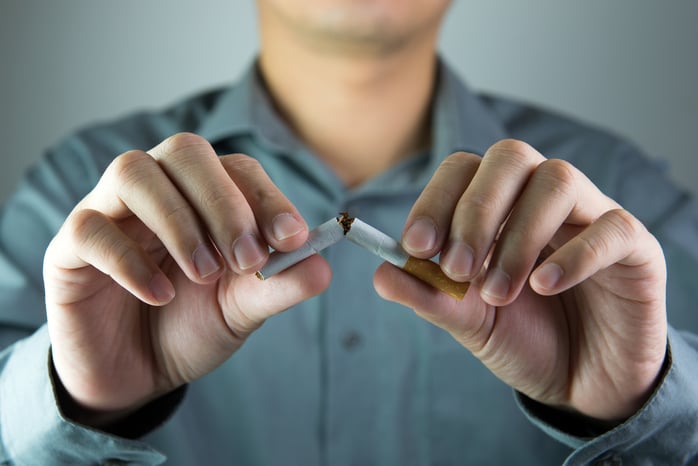
You probably know tobacco use is bad for your health. In fact, over-the-counter tobacco products are legally required to include one of the following warning labels reminding the public of tobacco’s dangers, especially the dangers of cancer.
Cigarette Warnings
- SURGEON GENERAL’S WARNING: Smoking Causes Lung Cancer, Heart Disease, Emphysema, and May Complicate Pregnancy.
- SURGEON GENERAL’S WARNING: Quitting Smoking Now Greatly Reduces Serious Risks to Your Health.
- SURGEON GENERAL’S WARNING: Smoking by Pregnant Women May Result in Fetal Injury, Premature Birth, and Low Birth Weight.
- SURGEON GENERAL’S WARNING: Cigarette Smoke Contains Carbon Monoxide.
Cigar Warnings
- WARNING: Cigar smoking can cause cancers of the mouth and throat, even if you do not inhale.
- WARNING: Cigar smoking can cause lung cancer and heart disease.
- WARNING: Cigars are not a safe alternative to cigarettes.
- WARNING: Tobacco smoke increases the risk of lung cancer and heart disease, even in nonsmokers.
- WARNING: Cigar use while pregnant can harm you and your baby.; or SURGEON GENERAL’S WARNING: Tobacco Use Increases the Risk of Infertility, Stillbirth and Low Birth Weight.
- WARNING: This product contains nicotine. Nicotine is an addictive chemical.
Smokeless Tobacco Warnings
- WARNING: This product may cause mouth cancer.
- WARNING: This product may cause gum disease and tooth loss.
- WARNING: This product is not a safe alternative to cigarettes.
Unquestionably, tobacco is harmful to your health. Yet, millions of people use it. In 2016, 15.5% of all adults and 13% of all adult cancer survivors reported being current cigarette smokers. Cigarette and cigar smoking is not only harmful to smokers, but it’s also harmful to those around them. Secondhand smoke exposure (breathing in smoke from another person’s cigarette or cigar) increases the risks of cancer, stroke, and heart attack.
Smoking During or after Cancer Treatment
If you’re a cancer survivor, all of the aforementioned warnings about the dangers of tobacco apply to you. There are also several additional reasons why you should not use tobacco products if you’ve had cancer. Smoking after cancer treatment:
- Increases the risk that your cancer will recur
- Increases the risk that you will develop a subsequent primary cancer (different cancer than you were already treated for)
- Increases your risk of dying if you were treated for smoking-related cancers. Your risk of dying will decrease if you stop smoking
- May reduce the effectiveness of cancer treatment
- May worsen long-term side effects of cancer treatment, including fatigue, nausea, hair loss, and pain
- Has a negative effect on pulmonary and immune function and wound healing
- May sabotage your efforts and ability to exercise regularly, which most cancer survivors are encouraged to do to benefit their health
- May undermine your ability to regain financial stability if your cancer caused you financial problems
Get Help to Quit Tobacco for Good
If you want to do what’s best for your health and the health of those around you, you’ll quit using tobacco products entirely. While that is often easier said than done, if you set your mind to it you can succeed!
If you’re ready to stop smoking, talk to your doctor about the best approach for you, which may include slowly tapering the amount of tobacco you use, quitting cold turkey, using nicotine replacement gum or patches, etc. There are also plenty of other resources available to help you quit. If you are one of our local Oregonians, the Oregon Health Authority has developed Smoke Free Oregon which provides assistance to those who want to stop smoking. The program includes counseling sessions, educational materials, and a 24-hour helpline. Their toll-free number is 1-800-QUIT-NOW. If you are not local, most states have a similar program, visit the American Lung Association for inspiration and advice.
Quitting tobacco is hard, but beating cancer is even harder. You survived cancer. You can kick your tobacco habit, too.
Sources:
- https://progressreport.cancer.gov/after/smoking
- https://academic.oup.com/annonc/article/24/10/2699/177103
- https://onlinelibrary.wiley.com/doi/pdf/10.1002/pon.3077


